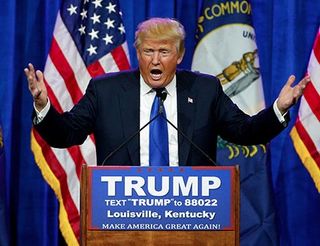ITIF: Trump Silent on Some Key Tech Issues

Trump quiet? On many tech and telecom issues, yes, says the Information Technology & Innovation Foundation (ITIF).
ITIF has just released its third quadrennial review of the presidential candidates' views on tech and telecom, and there are a lot of gaps on the Donald Trump side of the ledger.
"In past elections, both parties’ nominees generally articulated positions on nearly all of the policy areas ITIF identified as key priorities for promoting innovation," said the report. "This is generally not the case in 2016."
Democrat Hillary Clinton has outlined most of her views on issues including network neutrality—she is for it—the rollout of 5G wireless—she will push for it—and broadband in every home—she says by 2020. Trump, well, hasn't.
In fact, Clinton released her full tech policy platform in advance of the convention and her nomination.
While Clinton gets a "Would engage government as an active partner with private industry in setting and implementing a technology and innovation agenda" as a general tech innovation policy, Trump gets: "General lack of focus or specificity," and "to the extent there is a sector focus, it is on traditional manufacturing."
ITIF pointed to something not usually associated with Donald Trump: reticence. "Trump has largely been silent when it comes to technology and innovation policy. And when he has spoken about the tech industry, his comments have sometimes been critical," said the report.
Broadcasting & Cable Newsletter
The smarter way to stay on top of broadcasting and cable industry. Sign up below
"[T]he most distinguishing feature of the Trump campaign agenda in this area has been its notable lack of articulated policy positions," a criticism that has dogged the candidate, at least in the media that he, in turn, criticizes sharply.
On broadband and telecom subsidies, Clinton is in the Obama mode, continuing the push for deployment with a target of 2020 for universal availability via supporting the FCC's Lifeline program, its Connect America Fund and Commerce's BTOP program. Clinton also backs a $25 billion infrastructure "bank"—read "subsidy"—for broadband and other projects, including high-speed broadband access through a "Model Digital Communities" program. Trump gets a "no position."
Clinton backs the multistakeholder model of Internet governance, including the handoff of domain naming from U.S. oversight, which is scheduled for the end of September. Trump gets a "no position."
There are some clear distinctions and positions on both sides when it comes to Title II reclassification of ISPs and net neutrality, though Trump's positions are gleaned from tweets or statements, while Clinton made her position clear in her tech policy platform and before that as Secretary of State, when she declared internet openness a basic freedom akin to the Four Freedoms cited by President Franklin D. Roosevelt.
Clinton strongly supports the new FCC rules and reclassification and backs a court fight to preserve it.
Trump has tweeted: “Obama’s attack on the internet is another top down power grab. Net neutrality is the Fairness Doctrine. Will target conservative media.”
On the issue of online speech, Clinton has said that she “will oppose efforts to block or degrade internet access or to shutdown social media," while also saying that the government and tech communities should work together to "deprive jihadists of virtual territory." Trump has said that he wants to work with the tech community to prevent online recruiting by terrorists and "would certainly be open to closing areas where we are at war with somebody," according to the report. But asked about the constitutionality of that shut down, Trump has also said: "Somebody will say, ‘Oh freedom of speech, freedom of speech.’ These are foolish people. We have a lot of foolish people.”
According to the report, there are few areas in which Trump has a position and Clinton doesn't but one is regulation.
While Clinton has no regulatory policy plank—though she strongly supports some individual regulations, like the Open Internet order—Trump has said he would issue a "temporary moratorium on all new agency regulations" and cancel "all illegal and overreaching executive orders," which President Obama has used to bypass a Congress that has been long on acrimony and short compromise.
ITIF points out that while Clinton has backed repurposing spectrum for 5G—as the FCC is doing even now, identifying underutilized spectrum, including government spectrum, another priority of the FCC and Obama Administration—and backs sharing regimes and a "civic Internet of Things," Trump gets a "no position" on his side of the telecom policy table.
ITIF has a message for both sides:
"Republicans all too often focus on limiting or denying government’s contributions to bolstering U.S. innovation and competitiveness, while Democrats often seem more interested in shackling rather than harnessing the power of American enterprise...Each side ultimately must bend if we are to restore or maintain U.S. economic greatness."
Contributing editor John Eggerton has been an editor and/or writer on media regulation, legislation and policy for over four decades, including covering the FCC, FTC, Congress, the major media trade associations, and the federal courts. In addition to Multichannel News and Broadcasting + Cable, his work has appeared in Radio World, TV Technology, TV Fax, This Week in Consumer Electronics, Variety and the Encyclopedia Britannica.

